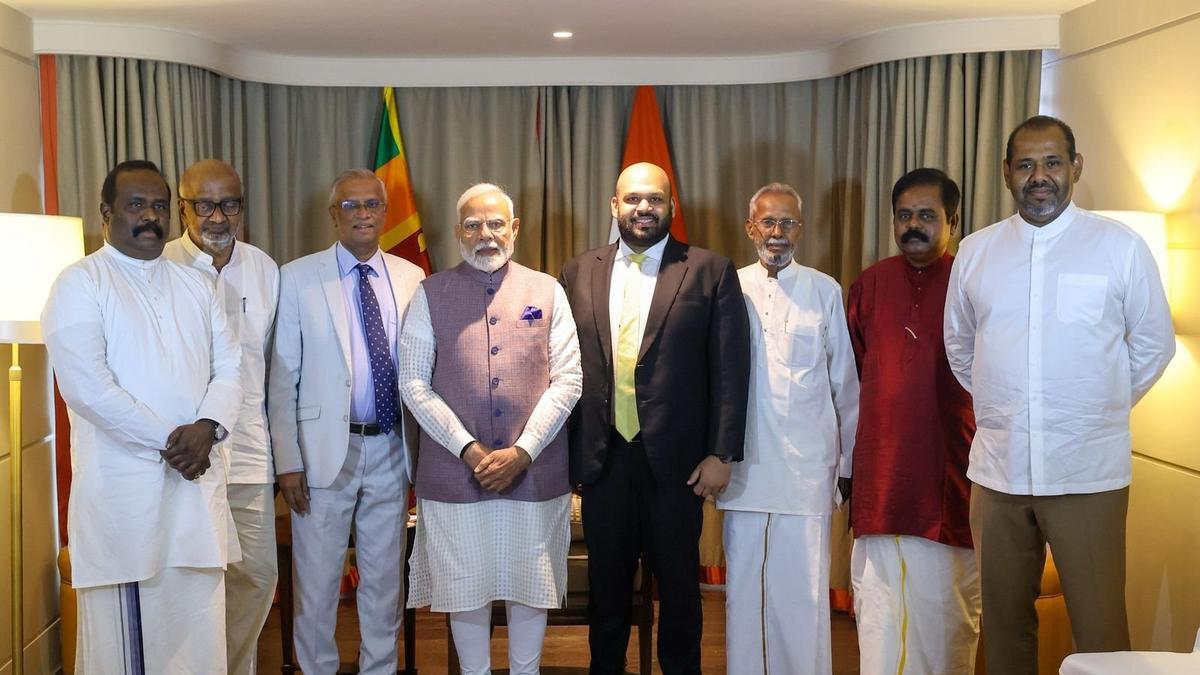
Tamil politicians from across the North-East said they had discussed the devolution of powers and federalism with Narendra Modi, as the Indian Prime Minister visited Colombo this weekend and said he “reiterated unwavering commitment to a life of equality, dignity and justice for the Tamil community”.
“It is always a pleasure to meet the leaders of the Tamil community of Sri Lanka,” tweeted Modi.
“Reiterated unwavering commitment to a life of equality, dignity and justice for the Tamil community within united Sri Lanka. Many projects and initiatives launched during my visit will contribute to their social, economic and cultural progress.”
It is always a pleasure to meet the leaders of the Tamil community of Sri Lanka. Conveyed my condolences on the passing of respected Tamil leaders, Thiru R. Sampanthan and Thiru Mavai Senathirajah, both of whom were personally known to me. Reiterated unwavering commitment to a… pic.twitter.com/xCjIcWkSrv
— Narendra Modi (@narendramodi) April 5, 2025
The group included members from key Tamil political parties such as the Ilankai Tamil Arasu Katchi (ITAK), Tamil National People’s Front (TNPF) People’s Liberation Organisation of Tamil Eelam (PLOTE), and the Tamil Eelam Liberation Organisation (TELO).
The discussions centred around the long-pending political solution for the Tamil nation and ongoing concerns around land grabs by the Sri Lankan state.
“Primarily, in today’s meeting, the implementation of the Indo-Sri Lanka Accord has not taken place—many shortcomings are evident,” ITAK general secretary M A Sumanthiran told reporters after the meeting.
“The 13th Amendment has not been fully implemented. If there is one thing both governments have agreed upon, it is that in the joint statements issued between Sri Lanka and India in 2010, 2011, and 2012, it was stated that the 13th Amendment would be fully implemented, built upon further, and a meaningful power-sharing arrangement would be established. That has not been done.”
“It is necessary to establish a meaningful power-sharing mechanism through a new constitution, based on the Indo-Sri Lanka Accord.”
“As a friendly, close neighbour, we urged India to encourage the Sri Lankan government to take steps towards meaningful devolution,” Sumanthiran told The Hindu. “We told him that our party was called the Federal Party and has pushed for a federal structure in governance.”
“Within a unitary state, all powers lie with the central government,” TNPF leader Gajendrakumar Ponnambalam told reporters. “In every matter, the central government's signature is essential. The essence of that system is that it does not allow for practical power-sharing.”
“Based on our experience of over three decades—thirty-eight years—we have seen that and cannot accept that. Even though the Indo-Lanka Accord was meant to resolve the Tamil ethnic issue, it has been brought under a unitary framework through the 13th Amendment. That is why, even today, the issues of the Tamil people remain unresolved.”
“During his first visit to Sri Lanka as Prime Minister, Mr. Modi, in his address to Parliament, emphasised an important point: he highlighted the need for co-operative federalism,” continued Ponnambalam. “Referring to that, we stress that within a unitary state, a solution cannot be found in any form. Only through a federal system of governance can the Indo-Lanka Accord be implemented effectively, providing a meaningful solution and allowing the Tamil people to fully experience its intended benefits.”
“In order to achieve this, we requested the Indian Prime Minister Modi that the Tamil parties be invited to Delhi. And to discuss a system where the Indo-Lanka Accord is implemented beyond the unitary system, through a comprehensive federal structure. We hope that India will accept this position and help bring about that outcome.”
The TNPF parliamentarian also spoke of how for Eelam Tamil fishermen, the issue of bottom trawling by Indian fishermen has become “life or death”.
“This issue needs to be brought to an end—we are expressing our stance on this. The plight of those affected by the fishermen issue in the North should be fully explained to our brothers in Tamil Nadu, to the fishermen working there. If the Indian government finds it helpful, our Tamil political leaders and fishermen unions can go there, meet those people, and convey these matters. We are ready to extend our full cooperation.”
.jpg)
Addressing the media alongside Sri Lankan president Anura Kumara Dissanayake in Colombo earlier in the day, Modi stated, “We hope that the Sri Lankan Government will meet the aspirations of the Tamil people and fulfil its commitment towards fully implementing the Constitution of Sri Lanka, and conducting Provincial Council Elections.”
Modi did not elaborate on the specific aspirations he referenced.
The 13th Amendment to the Sri Lankan constitution, which was enacted through the 1987 Indo-Lanka Accord mandates the creation of a merged North-East and a Provincial Council system, which has long been criticised as Tamils for not allowing adequate devolution. Dissanayake’s party fought staunchly against the accord and state it remains against its implementation.

